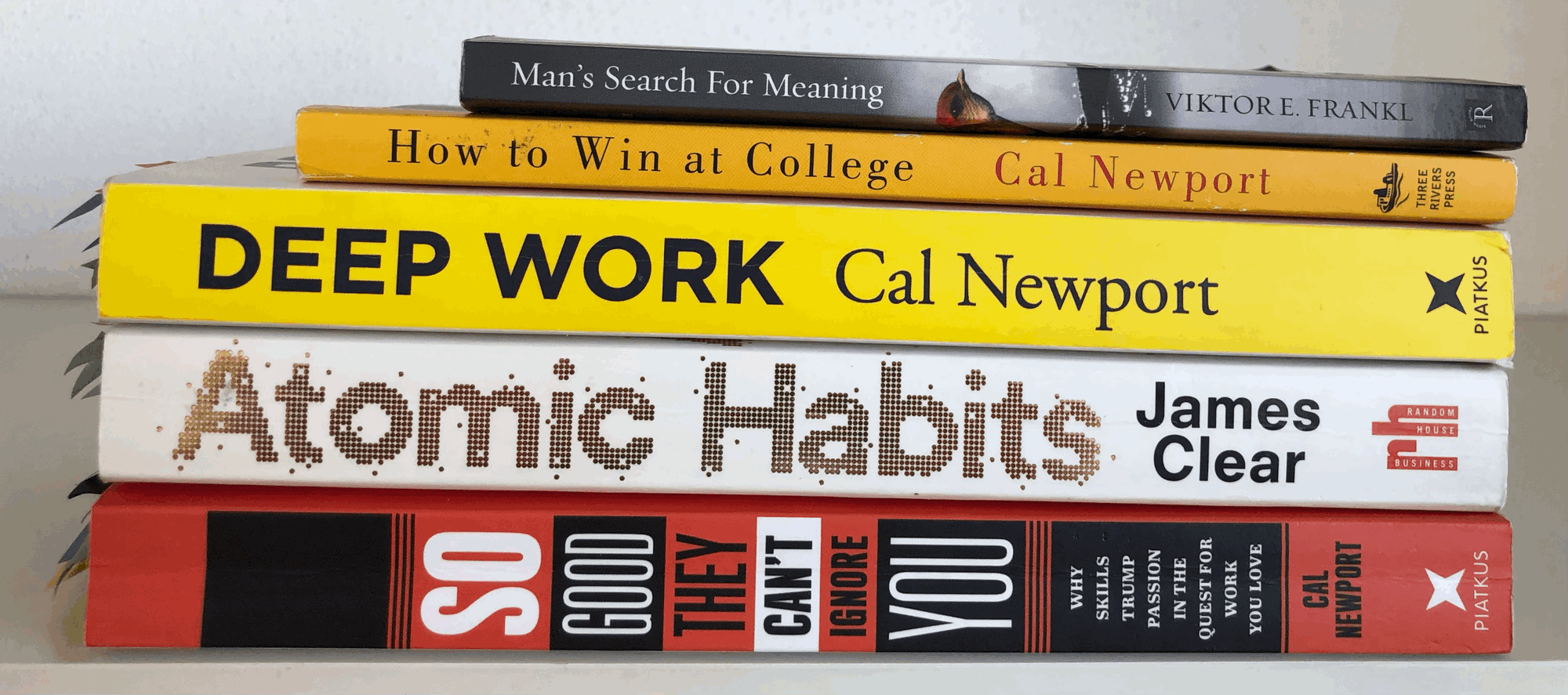January's reads
Viktor Frankl, James Clear, Cal Newport, and Eric-Emmanuel Schmitt

The year 2022 got me started with a large batch of books. On my table, more than 20 books are waiting to be read. Though I've always been fond of reading, this year has marked some change. While I can not point my sudden increase in reading to any specific event, I know that it started with me buying a couple of books. Among these books are classics, such as Man's Search For Meaning by four-time concentration camp survivor Viktor Frankl and more profane works, such as Atomic Habits by James Clear.
In no particular order, these are the books I had the chance and joy to read in January 2022.
Deep Work, by Cal Newport
Cal Newport is an American professor of computer science. His non-academic work, in his blog, Study Hacks, and books, focuses on how our relationship with technology affects us.
I found his book to be a fascinating read. Its primary focus is on the need for Deep Work, long stretches of uninterrupted time where real progress is made. Being productive, it turns out, is not the same as being busy. And: you need some time both to ease into the task at hand and, more crucially, to switch to the next one.
So Good They Can't Ignore You, by Cal Newport
This book was the third title I read by Cal Newport, after Deep Work and How To Win At College. In So Good, Newport examines the ingredients for a meaningful and rewarding career. Quite early on, he stresses that one's pre-existing passions might not be the best determinators for satisfying work. Instead, he shows that it might be that the passion follows after you've become skilled at your job.
This book provides uncommon career advice and gives plenty of examples where this has led to fascinating paths.
How To Win At College, also by Cal Newport
It seems as if I've got a challenge going on: read as many books as possible from the same author. That's not correct, albeit Cal Newport's works are exciting and engaging. As for this particular book, I wish I had read it while still studying. It covers a vast range of advice for students at higher education institutions. There are only a few standard bits of advice (e.g., don't pull an all-nighter), the majority of tips--which stem from top students all across the states--is refreshing and surprising.
Though, as mentioned, I am no longer the primary target of this work, it nonetheless contains workable advice for any job.
Atomic Habits, by James Clear
The introduction of this book is captivating. As is the rest, but it got me captured. Without revealing anything about you, it explains how Clear advanced from a severe accident to receiving his university's highest honours, the President's Medal. Critical to this transformation are tiny habits that, considered in isolation, might not spark much excitement. However, as the author details, it's the compound effect of multiple such small practices that gets you forward.
In the book, James Clear shows both how to break bad habits and add new, healthy ones to your stack. For these two aspects alone, the book is well worth being read. Additionally, Clear also details how to actually incorporate these habits, what to seek, and what to avoid. A true recommendation.
Man's Search For Meaning, by Viktor Frankl
Books dealing with the Holocaust are never an easy read. I've read some works about this dark phase of German and European failure before, such as The Night in Lisbon and Spark of Life (horrifying and saddening, definitely recommended) novels by Erich Maria Remarque. Thankfully, this book is not as devastating but shows how humanity can thrive even in unbearable conditions.
As a trained psychotherapist, Frankl has a unique view of life inside a concentration camp. He proves that "He who has a why to live can bear almost any how" (Nietzsche) is accurate. He observed that those who had a raison d'etre were the ones that were most likely to come out alive.
In my view, this is a mandatory read for people wishing to find out about what makes a life worth living.
Milarepa, by Eric-Emmanuel Schmitt
I first encountered his works by devouring Oscar And The Lady In Pink, a book about a terminally ill boy named Oscar searching for a why. While that book covered Christianity, Milarepa covers Tibetan Buddhism by telling the story of a hateful, unjustly outcast man. Seeking revenge on his uncle, who was responsible for his misfortune, he brings havoc to the lands.

Like the other novel by Schmitt, Milarepa is a read short in the number of pages but exceedingly rich in the number of ideas contained within them.
